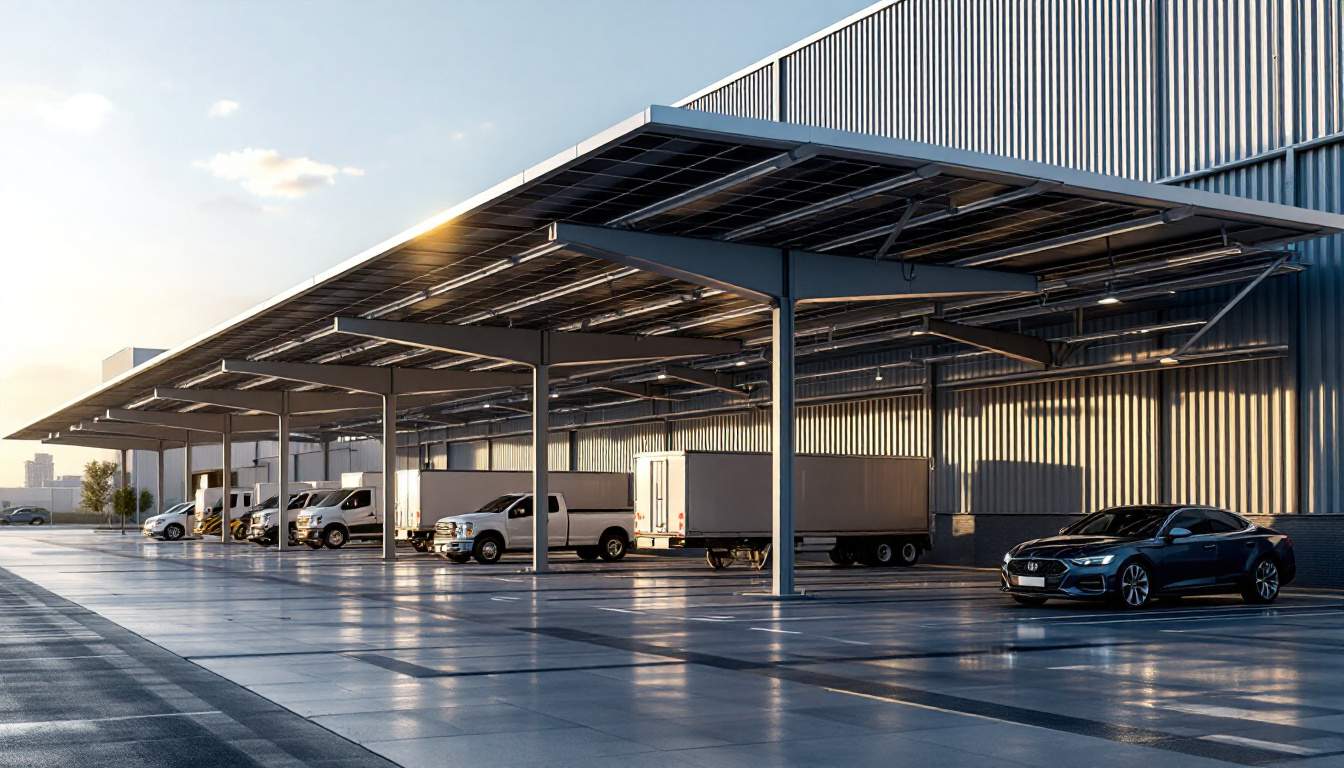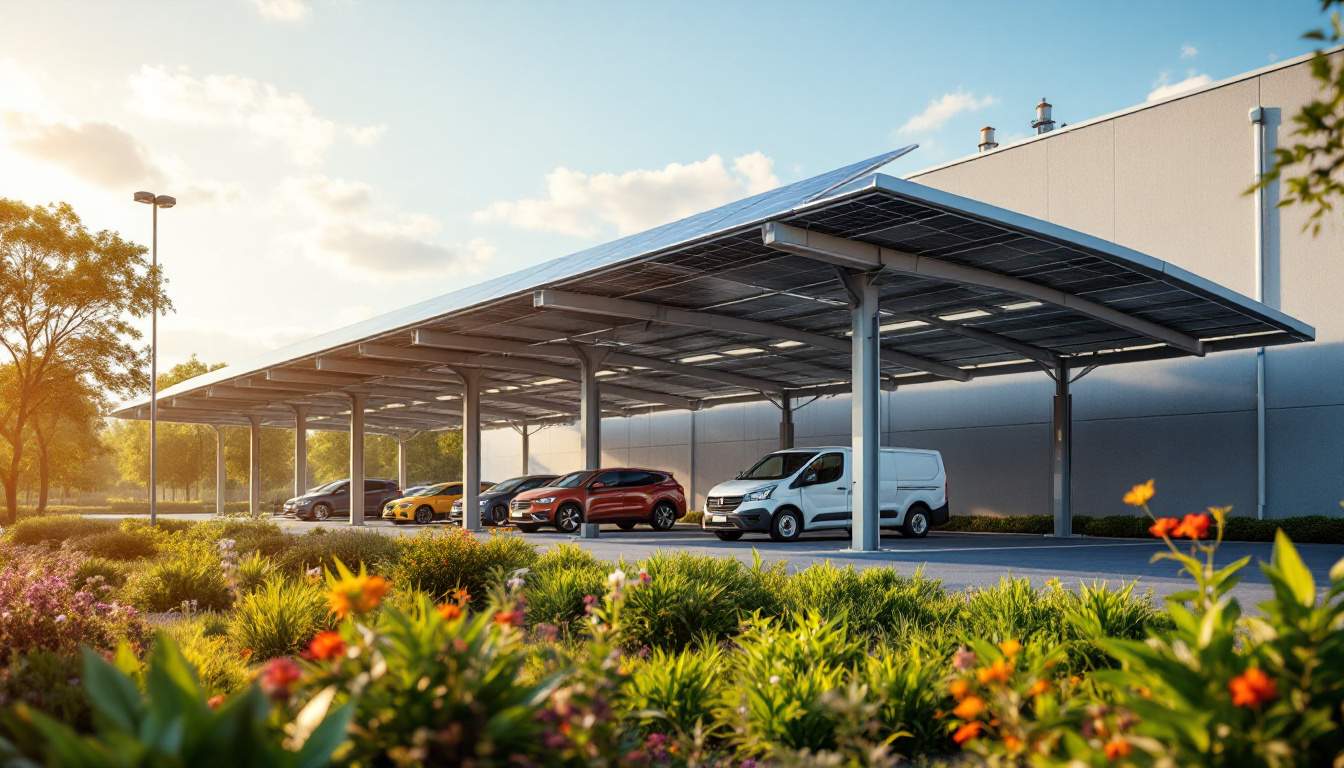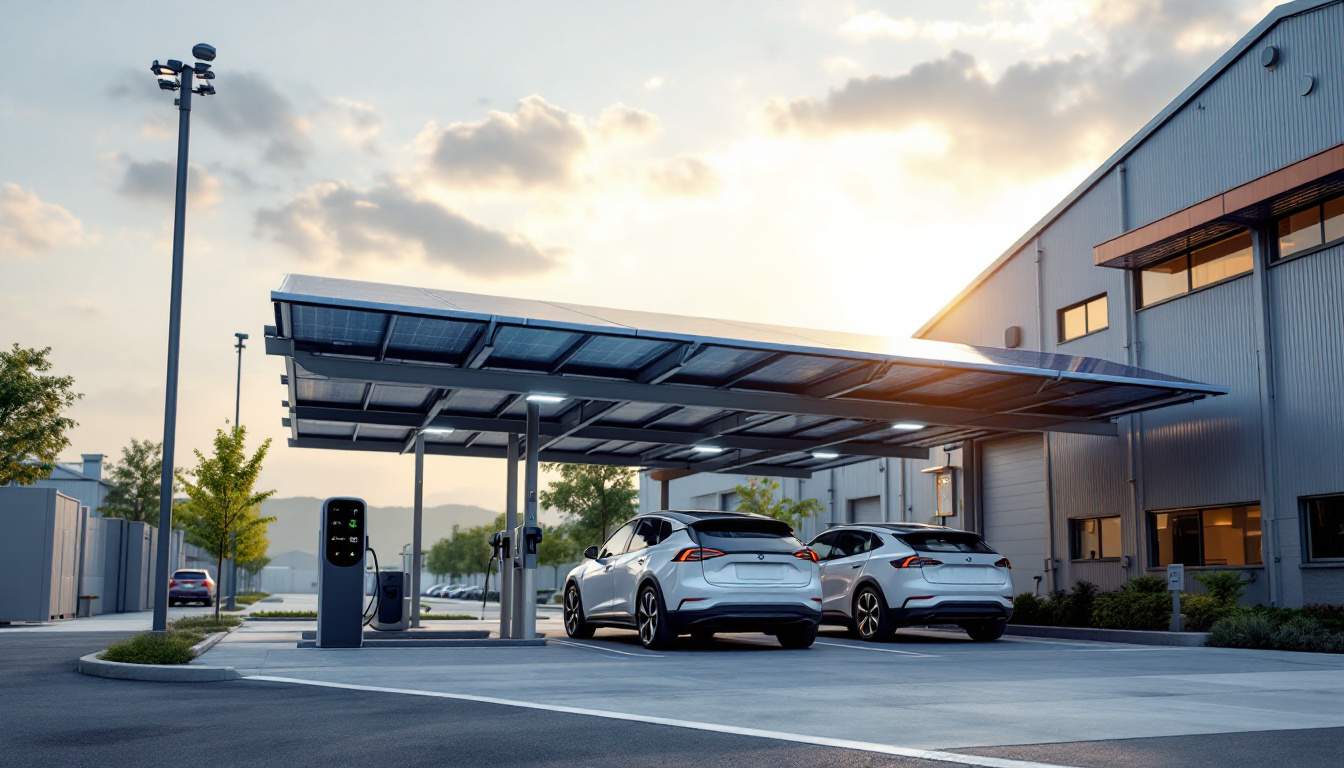In today’s rapidly evolving industrial landscape, manufacturing plants are constantly seeking innovative ways to reduce operational costs while enhancing sustainability. One such solution that has gained significant traction is the implementation of solar carports. These structures not only provide shade and protection for vehicles but also harness the power of the sun to generate clean, renewable energy. By integrating solar carports into their facilities, manufacturing plants can achieve substantial savings and contribute to a greener future.
The Economic Benefits of Solar Carports
Investing in solar carports can lead to significant financial advantages for manufacturing plants. By generating their own electricity, plants can reduce dependency on traditional energy sources, leading to lower utility bills and increased energy independence. Additionally, solar carports can offer a new revenue stream through net metering and other incentive programs. The initial investment in solar technology may seem daunting, but the long-term financial benefits often outweigh the costs, making it a strategic move for many manufacturing facilities. Furthermore, as technology advances and the cost of solar panels continues to decrease, the return on investment (ROI) for solar carports becomes even more attractive, allowing plants to allocate resources to other critical areas of their operations.

Reducing Energy Costs
One of the primary benefits of solar carports is the reduction in energy costs. By utilizing solar panels to generate electricity, manufacturing plants can significantly decrease their reliance on the grid. This not only lowers monthly utility expenses but also provides a buffer against fluctuating energy prices. The stability of solar energy pricing, compared to the volatility of fossil fuel markets, offers a predictable cost structure that can aid in long-term financial planning. Moreover, the energy produced by solar carports can be used to power various operations within the plant, from lighting to machinery, further enhancing cost savings. Over time, these savings can offset the initial investment in solar technology, making it a financially viable option for many facilities. Additionally, the ability to forecast energy costs with greater accuracy allows manufacturing plants to make informed decisions regarding their operational budgets and capital expenditures.
Furthermore, the implementation of energy-efficient practices alongside solar carports can amplify savings. For instance, integrating energy management systems can optimize energy consumption, ensuring that the electricity generated is used most effectively. This holistic approach not only maximizes the benefits of solar energy but also fosters a culture of sustainability within the organization, encouraging employees to adopt energy-saving habits that contribute to overall efficiency.
Incentives and Tax Benefits
Manufacturing plants can also take advantage of various incentives and tax benefits associated with solar energy installations. Many governments offer tax credits, rebates, and grants to encourage the adoption of renewable energy solutions. These financial incentives can significantly reduce the upfront costs of installing solar carports, making them an attractive option for cost-conscious businesses. Additionally, the availability of low-interest loans and financing options can further ease the financial burden, allowing plants to spread the cost of installation over time while still reaping the benefits of solar energy from day one.
Moreover, programs like net metering allow plants to sell excess energy back to the grid, creating an additional revenue stream. This not only enhances the financial viability of solar carports but also supports the broader transition to renewable energy. By participating in such programs, manufacturing plants can contribute to the stability of the energy grid while benefiting from additional income. The combination of these incentives and the potential for energy savings creates a compelling case for the adoption of solar carports, making them a strategic investment for the future.
Environmental Impact and Sustainability
Beyond the economic benefits, solar carports play a crucial role in promoting environmental sustainability. By harnessing solar energy, manufacturing plants can reduce their carbon footprint and contribute to a cleaner, more sustainable future. This aligns with the growing demand for environmentally responsible business practices and can enhance a company’s reputation and brand image. As consumers become increasingly aware of environmental issues, businesses that prioritize sustainability are often favored in the marketplace, leading to increased customer loyalty and brand equity.

Reducing Carbon Emissions
Solar carports help manufacturing plants reduce their carbon emissions by decreasing reliance on fossil fuels. By generating clean energy on-site, plants can significantly lower their greenhouse gas emissions, contributing to global efforts to combat climate change. This reduction in emissions not only benefits the environment but also aligns with regulatory requirements and industry standards aimed at promoting sustainability. By adopting solar carports, manufacturing plants can demonstrate their commitment to environmental stewardship and corporate responsibility. Furthermore, the positive environmental impact of solar carports can be quantified and reported, allowing companies to showcase their sustainability achievements to stakeholders, investors, and customers alike.
In addition to reducing carbon emissions, solar carports can also help mitigate other environmental impacts associated with traditional energy sources, such as air and water pollution. By transitioning to renewable energy, manufacturing plants can play a pivotal role in fostering a healthier ecosystem and promoting biodiversity. This commitment to environmental sustainability can also open doors to partnerships with environmental organizations and initiatives, further enhancing a company’s reputation as a leader in corporate social responsibility.
Enhancing Corporate Social Responsibility
Incorporating solar carports into manufacturing operations can enhance a company’s corporate social responsibility (CSR) initiatives. By investing in renewable energy, plants can showcase their dedication to sustainable practices and community well-being. This commitment to sustainability can improve stakeholder relations, attract environmentally conscious customers, and strengthen partnerships with like-minded organizations. As a result, solar carports can serve as a powerful tool for enhancing a company’s CSR profile and overall brand image. Additionally, companies that actively promote their sustainability efforts often find that they can attract top talent, as many employees today seek to work for organizations that align with their values.
Moreover, the visibility of solar carports can serve as a marketing asset, allowing companies to communicate their commitment to sustainability to customers and the community. By hosting educational events or tours of their solar carport installations, manufacturing plants can engage with local communities, fostering goodwill and enhancing their public image. This proactive approach to CSR not only benefits the environment but also strengthens the company’s position in the marketplace, creating a win-win scenario for both the business and the community.
Operational Advantages of Solar Carports
In addition to economic and environmental benefits, solar carports offer several operational advantages for manufacturing plants. These structures can improve site functionality, enhance employee satisfaction, and provide additional security features. The integration of solar carports into manufacturing facilities can also lead to improved operational efficiency, as the energy generated can be utilized for various on-site processes, reducing the need for external energy sources and streamlining operations.

Improving Site Functionality
Solar carports can enhance the functionality of manufacturing sites by providing shaded parking areas for employees and visitors. This not only improves the overall aesthetics of the facility but also protects vehicles from weather-related damage. Furthermore, solar carports can be integrated with electric vehicle (EV) charging stations, supporting the growing demand for EV infrastructure. This can attract environmentally conscious employees and customers, further enhancing the plant’s sustainability efforts. The presence of EV charging stations can also encourage employees to consider electric vehicles as a viable transportation option, contributing to a reduction in overall emissions associated with commuting.
Additionally, solar carports can be designed to accommodate various functionalities beyond parking. For instance, they can serve as venues for outdoor meetings, employee gatherings, or community events, creating a multifunctional space that fosters collaboration and engagement. This versatility not only maximizes the use of the space but also reinforces the company’s commitment to sustainability and innovation. By creating a welcoming environment that encourages interaction and teamwork, manufacturing plants can enhance their workplace culture and promote a sense of community among employees.
Enhancing Employee Satisfaction
Providing shaded parking through solar carports can significantly enhance employee satisfaction. By offering protection from the elements, plants can create a more comfortable and convenient parking experience for their workforce. This can lead to increased employee morale and productivity, as well as reduced absenteeism. Additionally, the presence of solar carports can serve as a visible reminder of the company’s commitment to sustainability, fostering a sense of pride and engagement among employees. When employees feel valued and supported by their employer, they are more likely to be motivated and committed to their work, leading to improved performance and retention rates.
Moreover, the implementation of solar carports can also serve as a catalyst for employee engagement initiatives. Companies can involve employees in sustainability efforts by encouraging them to participate in energy-saving programs or volunteer opportunities related to renewable energy. This involvement not only strengthens the bond between employees and the organization but also cultivates a culture of sustainability that permeates all levels of the company. By empowering employees to take an active role in sustainability initiatives, manufacturing plants can foster a sense of ownership and responsibility, further enhancing overall job satisfaction.
Security and Safety Features
Solar carports can also enhance security and safety at manufacturing sites. By incorporating lighting and surveillance systems into the carport design, plants can improve visibility and deter potential security threats. This added layer of security can protect both employees and assets, contributing to a safer and more secure working environment. Additionally, the presence of well-lit parking areas can reduce the risk of accidents and injuries, further enhancing site safety. The integration of advanced security technologies, such as motion sensors and remote monitoring systems, can provide real-time alerts and enhance the overall security posture of the facility.
Furthermore, the design of solar carports can be tailored to meet specific safety standards and regulations, ensuring compliance with local laws and industry best practices. By prioritizing safety in the design and implementation of solar carports, manufacturing plants can create a safer workplace for their employees, reducing the likelihood of accidents and associated costs. This commitment to safety not only protects employees but also enhances the company’s reputation as a responsible employer, attracting top talent and fostering loyalty among the workforce.
Conclusion: Embracing the Future with Solar Carports
In conclusion, solar carports offer a multitude of benefits for manufacturing plants, from economic savings and environmental sustainability to operational enhancements and improved employee satisfaction. By investing in this innovative solution, plants can position themselves at the forefront of the renewable energy movement, driving positive change for both their business and the planet. The integration of solar carports into manufacturing operations represents a forward-thinking approach that aligns with the global shift towards sustainability and renewable energy.
As the demand for sustainable practices continues to grow, manufacturing plants that embrace solar carports will not only enjoy significant cost savings but also contribute to a cleaner, more sustainable future. By harnessing the power of the sun, these facilities can achieve energy independence, reduce their carbon footprint, and enhance their corporate social responsibility initiatives, paving the way for a brighter, more sustainable tomorrow. The transition to solar energy is not just a trend; it is a necessary step towards a more sustainable and resilient future for manufacturing and the planet as a whole.
